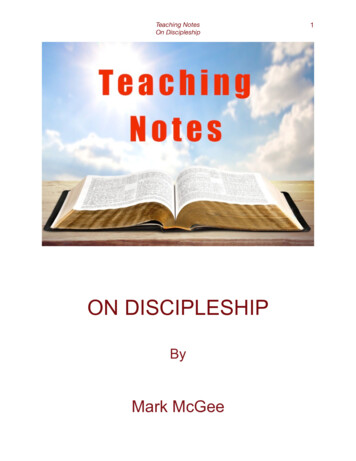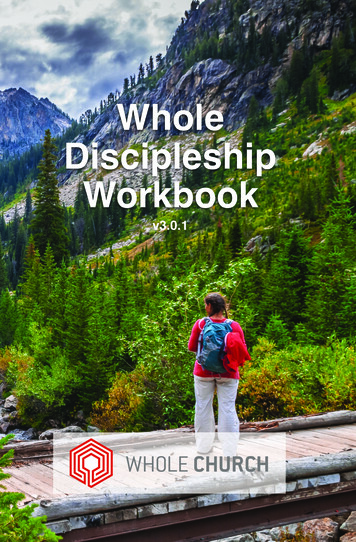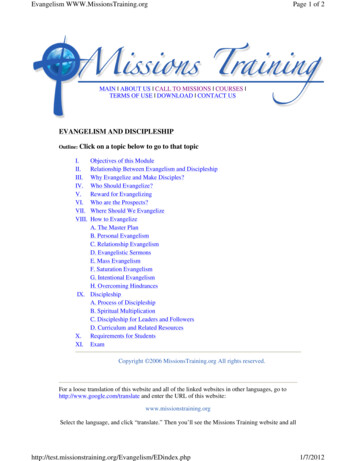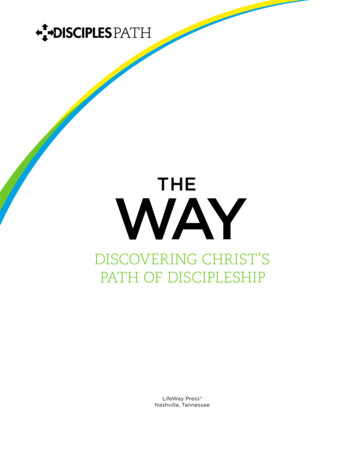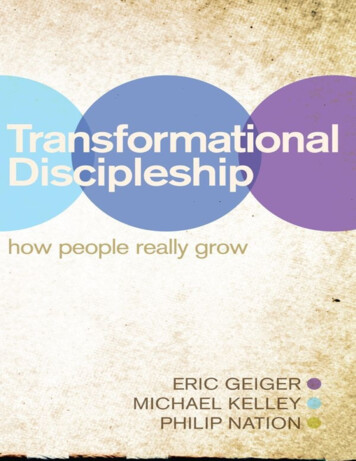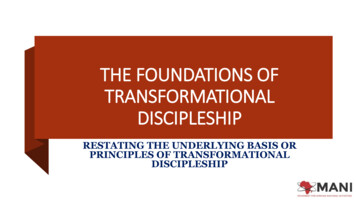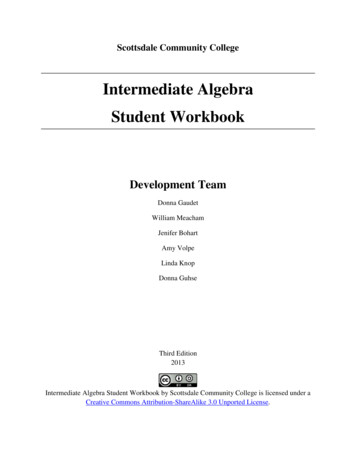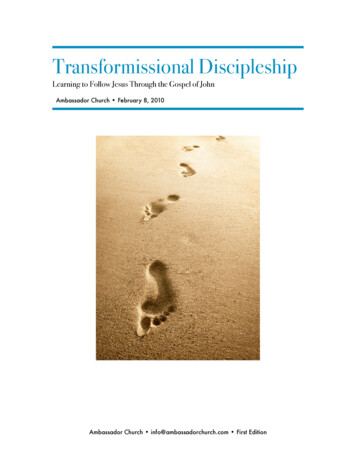
Transcription
Transformissional DiscipleshipLearning to Follow Jesus Through the Gospel of JohnAmbassador Church February 8, 2010Ambassador Church info@ambassadorchurch.com First Edition
Table of ContentsLearning to Follow Jesus through the Gospel of JohnA GUIDE TO GROWING DEEPER AND WIDER IN OUR WALK WITHCHRIST THROUGH THE GOSPEL OF JOHNA Word from the Pastor!!!!!!3Getting the Most from this Manual!!!!!!5Study Format!!Discipleship Covenant!!!!!!!!!!6!!!!!!!7Book 1!Chapter 1!Following Jesus (Call to Discipleship) (John 1:35-50)! 8!Chapter 2!Cleansing the Temple (John 2:12-24)!!15!Chapter 3!Nature of Spiritual Transformation (John 3:1-21)!21!Chapter 4!Sharing Our Faith (John 4:1-26)!!!33!Chapter 5!Healing and Compassion (John 5:1-15)! !!40!Chapter 6!God’s Provision (John 6:1-14)!!!!46!Chapter 7!Who is Jesus? (John 7:25-44)!!!!51!!!!55Appendix!!!!!!!!2
A Word From the PastorLearning to Follow Jesus through the Gospel of John!In the movie, “The Book of Eli” (2010), the main character wanders througha barren wasteland that has been devastated by some catastrophic event thirtyyears prior. He is one of the few people alive, and in his possession is the lastremaining Bible on earth. His mission is simply to carry this book across thewasteland to the west. Along the way, he defends the book against those whowant to steal it and use it for their own selfish purposes. Without giving awaywhat happens, toward the end of the movie, he makes a heart-felt confession. Heconfesses that while he spent so much time protecting the book, he regrets nothaving lived by the book.!As I watched this movie, I was reminded that as followers of Jesus, itshould not be our goal to simply carry around our Bibles, or to be collectors ofevery version of the Bible. While we may love the book and protect it, the goal ofour lives is to live according to the book so we can be transformed by it andchange the world around us. This is what it means to be a disciple.!A “disciple” is simply a follower of Jesus and “discipleship” is the processof helping others become followers of him. As followers of Jesus, the manual forteaching us how to live our lives is the Bible. While no one would argue thatknowledge of the Bible is important, the most important thing is to be living ourlives by it, not just reading or even studying it. Just as the Bible is essential fordiscipleship, the process by which God uses to help us grow is through others,especially others who are further along in their spiritual journey than we are.3
Therefore, the combination of someone else helping us walk through God’s wordis the process of discipleship.!Our purpose with this workbook is to have you discipled and to discipleothers through the God’s Word. Because the Bible is so immense in content, wehave selected the Gospel of John as a place for us to begin this journey.!Our prayer is that this material will help you grow deeper as a disciple ofJesus Christ. Please let us know how your journey of following Jesus is going,and how we can help encourage you! May God bless you as you gaze upon theglory of the Son who came to earth to dwell among us (John 1:14). May youbecome more and more like our Savior, Jesus Christ.Pastor Ray ChangPastorRay@ambassadorchurch.com4
Getting the Most out of this BookLearning to Follow Jesus through the Gospel of JohnTo get the most out of this workbook, you need to make some key commitments:1)Commitment to a Discipleship RelationshipYou need to make a commitment to others in your group that you willcomplete this workbook together. While the workbook is an importantpart of the process – the workbook is not the process. The discipleshipprocess is based on relationships. The key is for commitment to arelationship and building the relationship together.2)Commitment to a Discipleship CovenantYou will need to establish a covenant with all the members involved.This is a covenant to establish the time, place, and duration of thisdiscipleship journey. A sample covenant is on page 7.3)Commitment to God’s Word and His Spirit to TransformUltimately, the only true transformation will come from God’s Spirit.We need to walk in the Spirit through His Word as He becomes theprimary agent of spiritual transformation in our lives. As you begin toread through the Gospel of John, ask the Holy Spirit to help youunderstand what you are studying.4)Commitment to MultiplyOur goal is not simply for people who have a relationship with God togo deeper in that relationship. The purpose of this discipleship processis for each disciple of Christ to pass on the work of discipleship toothers. From the onset, your goal is to find someone else that you canbegin discipling.5
Study FormatWhat you can expect in this workbookBig Idea- This will be the main focus of the lesson for the chapter.Key Memory Verse- Each chapter will have a memory verse as part of ourdiscipleship process. As we memorize Scripture, our lives will begin to be shapedby Scripture.Digging Deeper- This is where we will examine the text to discover what theBible has to say about the passage. The goal of Bible study is not just information,but ultimately application.Living Wider- Each section will have a follow up with reading, furtherdiscussions or application.!6
Discipleship CovenantLearning to Follow Jesus through the Gospel of JohnIn order to grow toward maturity in Christ by completing the workbook, Icommit to the following standards:1. Complete all assignments on a weekly basis prior to my discipleshipappointment in order to contribute fully.2. Meet weekly with my discipleship partners for approximately one and onehalf hours to dialogue over the content of the assignments:3. Offer myself fully to the Lord with the anticipation that I am entering a time ofaccelerated transformation during this discipleship period.4. Contribute to a climate of honesty, trust and personal vulnerability in a spiritof mutual encouragement.5.Give serious consideration to continuing the discipling chain by committingmyself to invest in at least two other people for the year following the initialcompletion of this workbook.6.Pray regularly for the Holy Spirit to open my eyes and change my heart tomake me more like Jesus.Signed !!!!!!Dated !!!(The above commitments are the minimum standards of accountability, whichare reviewed and renewed before lessons eight and fifteen. Feel free to add anyother elements to your covenant.)7
Following Jesus - Call to DiscipleshipJohn 1:35-50SUMMARY POINTSMemory Verse: John 1:40-41Digging Deeper: John 1:35-51Living Wider: Reading, "A Biblical Call to Making Disciples" by Greg OgdenBIG IDEAJesus calls ordinary people to follow him as disciples. He promises to show them"greater things" and ultimately change the world through this relationship.Definition of Discipleship“Discipleship is an intentional process over a period of time based on arelationship and God's Word to equip a person to be a follower of Jesus for deepspiritual maturity and wide missional impact. "1. What are the elements of discipleship mentioned in this definition?2. Restate this definition in your own words.3. How does this apply in your life? What questions does this raise in your life?MEMORY VERSEIn John 1:40-41, we see for the first time Jesus calling men to follow him. Noticewho they were and why they were following Jesus.8
“Andrew, Simon Peter's brother, was one of the two who heard what John hadsaid and who had followed Jesus. The first thing Andrew did was to find hisbrother Simon and tell him, "We have found the Messiah" (that is, the Christ).”John 1:40-411. Context: In John 1, we see Jesus calling the disciples to himself. What strikesyou about the way Jesus calls people?2. Summarize this passage in your own words:3. How can you apply this passage to being a disciple and/or making disciples?DIGGING DEEPERTo understand John’s Gospel, you have to look at the bookends in John 1 andJohn 20. Chapter 1:1 records the identity of Jesus as the Son of God, "In thebeginning was the Word, and the Word was with God, and the Word was God."Chapter 20:31 states the purpose of this book, "But these are written that you maybelieve that Jesus is the Christ, the Son of God, and that by believing you mayhave life in his name."In the prologue and postlude, we see that Jesus came as God's Son to bringsalvation to those who believe. While this is the purpose of the book, it isimportant to notice that the method Jesus chooses to use to carry out his work isthrough the development of followers, called “disciples”.9
Discipleship is the process of becoming more like Jesus. Part of our purpose inbecoming more like Jesus is to live in a way that pleases God, so that we canbetter to share Jesus with those around us. Let's explore who Jesus calls and why.1. Read John 1:35-51. What do you notice about the people Jesus called?2. How did Jesus call them? Why did he call them?3. Compare this with other passages in the gospels where Jesus calls his firstdisciples (Luke 5:1-11) . How does this passage help us understand more abouthow Jesus calls his followers?4. As Jesus gathers growing number of followers, he eventually selects twelve,which he called “the twelve” (John 6:67) or “apostles” (the sent ones) (Mark3:13-19). What does Jesus do before he identifies the twelve? (See Luke 6:12-16)5. While the other three gospels give a very similar account of the calling of thedisciples, John gives a very personal account of Jesus' calling. What do you noticeabout the personal nature of Jesus' call?10
6. From this passage, what are some ingredients to a discipleship relationship?See John 1:39,41,50.7. How did Jesus call you to be his follower?8. What questions does this passage raise for you about discipleship?9. When selecting someone to disciple, how does this passage and other passagesin the gospels guide your selection process?10. What can you apply in this passage to your life right now (e.g., sin to confess,action to do, areas to grow, etc.)?LIVING WIDER“MAKING OF A DISCIPLE” BY GREG ODGENWhen Jesus commanded his disciples to "go and make disciples of all nations" (Matthew 28: 19),he spoke the mission statement for the church. Jesus told his disciples to do what he had doneduring his three years of ministry. Jesus made disciples by selecting a few into whom he pouredhis life.11
Jesus' Method of Disciple-MakingWhat was the strategic advantage of having 12 men who would "be with him" (Mark 3: 14)?There are many reasons, but two seem most relevant: Internalization. By focusing on a few, Jesus was able to ensure the lasting nature of his mission.We might wonder why Jesus would risk others' jealousy by publicly selecting 12 from a largergroup of disciples (Luke 6:13). Why didn't Jesus simply continue to expand his growingentourage and create a mass movement? The apostle John captures Jesus' caution when peopleclamored to him because of the marvelous signs: "But Jesus on his part would not entrust himselfto them, because he knew all people and needed no one to testify about anyone for he himselfknew what was in everyone" (John 2:24-25 NRSV). Though Jesus ministered to the needs of thecrowds, he knew they were fickle. The same ones who shouted "Hosanna" on Palm Sunday wereshouting "Crucify him" five days later on Good Friday. Knowing the whims of the throng, Jesusbuilt his ministry on a select few who would form the superstructure of his future kingdom.Disciples cannot be mass produced, but are the product of intimate and personal investment. A.B. Bruce summarizes this point: "The careful, painstaking education of the disciples secured thatthe Teacher's influence on the world should be permanent, his Kingdom should be founded ondeep indestructible convictions in the minds of few, not on the shifting sands of superficialimpressions on the minds of many." Multiplication. Just because Jesus focused much of his attention on a few does not mean that hedid not want to reach the multitudes. Just the opposite. Eugene Peterson puts truth cleverly:"Jesus, it must be remembered, restricted nine-tenths of his ministry to 12 Jews, because it was theonly way reach all Americans." Jesus had enough vision to think small. Focusing did not limit hisinfluence-it expanded it. When Jesus ascended to the Father, he knew that there were at least 11others who could minister under the authority of his name-an eleven fold multiplication of hisministry. Robert Coleman captures the heart of Jesus' methodology when he writes, "[Jesus']concern was not with programs to reach the multitudes but with men the multitudes wouldfollow."Paul's Approach to Disciple-MakingWe see that the apostle Paul adopted the same goal and methodology in his ministry that Jesusmodeled. Paul's version of the Great Commission is his personal mission statement: "We proclaimhim, admonishing and teaching everyone with all wisdom, so that we may present everyoneperfect in Christ. To this end I labor, struggling with all his energy, which so powerfully workswithin me" (Colossians 1:28-29). Paul is so passionate about making disciples that he compareshis agony over the maturity of the flock to the labor pains of a woman giving birth: "My dearchildren, for whom I am again in the pains of childbirth until Christ is formed in you" (Galatians4:19).Following Jesus' method, Paul invested in individuals to make disciples. He too had his sights onthe multitudes, but he knew that solid transmission of the faith would not occur as readilythrough speaking to an audience. Paul encouraged Timothy to use a personal style to link thegospel to future generations when he exhorted him, "What you have heard from me throughmany witnesses entrust to faithful people who will be able to teach others as well" (2 Timothy 2:2NRSV, emphasis added). Paul envisioned an intergenerational chain of disciples linked together12
through personal investment. Contained in this verse are generations in the discipling network,creating the following path: Paul » Timothy » faithful people » teach others.We know Paul lived out this admonition, for his letters are filled with the names of those towhom he gave himself. Paul replaced himself in the battle with soldiers like Timothy, Titus, Silas(Silvanus), Euodia, Syntyche, Epaphroditus, and Priscilla and Aquila. They accompanied Paul onhis missionary journeys, were entrusted with ministry responsibility, and became co-laborers inthe gospel. Paul attributed the change in their lives to the impact of the message of Christ in hislife on them.The Bible teaches us not only the message of our faith, but also the method by which that faith isto be passed on to future generations. We are called to do God's work in God's way. The mannerin which the Lord works is incarnational: life rubs up against life. We pass on Christlikenessthrough intimate modeling. Paul said, "I urge you to imitate me" (l Corinthians 4: (6) and "Youbecame imitators of us and of the Lord" (I Thessalonians 1:6).Disciple-Making TodayDisciple-making ensures that the gospel is embedded deeply in the lives of mature believers whoserve as links to the future. Discipling, then, is a relationship where we intentionally walkalongside a growing disciple or disciples in order to encourage, correct, and challenge them inlove to grow toward maturity in Christ.There are three ingredients necessary to produce maturity in Christ. First, "relationalvulnerability" means honest, self-disclosing and confessional relationships that give the HolySpirit permission to remake us. Second, "the centrality of truth" is emphasized when people opentheir lives to one another around the truth of God's Word, and the Lord begins to rebuild theirlives from the inside out. And third, "mutual accountability" is authority given to others to holdus accountable to mutually agreeable standards-"iron sharpening iron."We will not make disciples through methods of mass production that attempt shortcuts tomaturity. Robert Coleman clarifies the challenge: "One must decide where he wants his ministryto count-in the momentary applause of popular recognition or the reproduction of his life in afew chosen men who will carryon his work after he has gone."The irony is that focusing on a few takes a long-range view by multiplying the number ofdisciples, and therefore expands a church's leadership base. Though adult education programsand small-group ministries are good tools to produce maturity, without the focus of smalldiscipling units, a solid foundation is difficult to build.Taken from Discipleship Essentials by Greg Ogden, Expanded Edition 2007. Used bypermission of InterVarsity Press, P.G. Box 1400, Downers Grove, IL, 60515-1426.DISCUSS1. What were the strengths of Jesus' and Paul's disciple-making methods? Whatwere the risks?13
2. Is it realistic to expect New Testament methods of discipleship to be effective intoday's culture? Why or why not?3. What steps will our church need to take in order to adopt a long-ragediscipleship program similar to Jesus' and Paul's?FOLLOW UP1. Listen to the sermon online on Transformissional Discipleship atwww.sermon.net/pastorray2. Read The Master Plan of Evangelism by Robert Coleman3. Read Transformation Discipleship by Greg Ogden4. Purchase The NIV Application Commentary by Gary Burge for further studyin John.14
Cleansing the TempleJohn 2:12-24SUMMARY POINTSMemory Verse: John 2:17Digging Deeper: John 2:12-24Living Wider: Reading, an excerpt from The NIV Application Commentary.BIG IDEAJesus leads by example in cleansing the temple, using this outward act ofpurification as a symbolic demonstration of the replacement of the Temple itself,which will be fulfilled in him.MEMORY VERSE“His disciples remembered that it is written, ‘Zeal for your house willconsume me’.” John 2:17!1. Context: Here in this passage, Jesus gives one example for his disciples of whatdiscipleship actually looks like in the real world; and it stirs up a memory in hisdisciples from Scripture. What catches your attention about this scenario?2. Summarize this passage in your own words.3. How can you apply this passage to being a disciple and/or making disciples?15
DIGGING DEEPERAs we continue our journey into discipleship, we can learn from the biblicalstories surrounding those who lived their daily lives with Jesus. Let’s explore ourpassage, and work through some of the ‘basic’ questions.1. Read John 2:12-17. Where is Jesus? Who is with him?2. Where does the passage tell us they are going? Why are they going there?3. What does Jesus find when he gets to the temple in Jerusalem?4. How does Jesus respond? Why do you think he responds that way?5. Read John 2:18-24. The Jews brought a demand to Jesus, yet he uses thisopportunity to give them something more than merely an answer to theirdemand. What is it that they demanded?6. What does the demand reveal about what the Jews were focusing on?16
7. As the encounter continues, what temple was Jesus talking about?8. When did the disciples remember what Jesus had said?9. What questions does this passage raise for you about following Jesus?10. What in this passage can you apply to your life right now (e.g., sin to confess;action to do; areas to grow; etc.)?LIVING WIDERThe following is an excerpt out of the Bridging Contexts section of “John 2:12-25” fromThe NIV Application Commentary, New Testament: John. By Gary M. Burge. Grand Rapids:Zondervan, 2000.!The temple story. We dare not miss the importance of what Jesus has done inJerusalem. When we begin to realize the significance and the grandeur of the Jerusalemtemple in Jesus’ day, we will begin to feel the magnitude of what he tried to do. The templewas the organizing center of Jewish life in the first century. It was the center of government(brokered at this time by Roman authority), judicial law, religious life, and taxation. It setthe moral, religious, and political tone of the country. When Judas Maccabeus decided todefeat the Greeks in the second century B.C., he knew he needed to capture the temple firstin order to win popular Jewish support. When the Romans occupied the land in 63 B.C.17
under the conquest of Pompey, they recognized immediately the need for a fortress inJerusalem next to the temple, and at once began fortifying the Antonia Fortress on thetemple’s northwest corner. This is the site where Pilate’s soldiers “prepared” Jesus forcrucifixion.!When the Zealots stood against Rome in A.D. 66, once again the temple became theirfortress and standard, the rallying point for Judaism’s fight for survival. The temple wasthe basis of Jewish religious and national pride. When we add to this Herod’s rebuildingprogram that lasted over eighty years, it is no wonder that when the Galilean disciples ofJesus arrive in Jerusalem, they exclaim about the wonder of the place. “Look, Teacher!What massive stones! What magnificent buildings!” (Mark 13:1). The Jerusalem templedazzled visitors. When the Roman Titus’s troops stormed the temple in A.D. 70, he was soamazed at the splendor of the place that he tried to preserve it from looting anddestruction. But his soldiers, having fought a vicious, lengthy battle for the city, discoveredits riches, and the temple was doomed. Burned to the ground in A.D. 70, it has never beenrebuilt. 18!Therefore Jesus’ activity was not merely upsetting, it was outrageous. He was in thecenter of the public square, and he made a public protest.!We have to be careful not to make too much of the violence of this scene, however. Ihave seen pictures of Jesus brandishing a terrible black whip, eyes glaring, tables flying,people running, animals yelping. The Jewish law stipulated that weapons could not bebrought into the temple, and a whip was classified as a weapon. Temple police(particularly at festival time) were charged with keeping public order. Hence Jesusprobably did not bring a formal whip into the temple, but instead improvised somethingwith straw or rushes used for animal bedding. If he had brought in anything else, I expecthe would have been arrested.!Nevertheless the scene is dramatic, provocative, and upsetting. Furniture wasbroken; animals went running; coins flew from their scales. Jesus makes a disturbance andacts out the core of his prophetic message. But it is not the power of the whip that makeshis message succeed. It is his moral power; the truth of what he says strikes to the heart ofthese people’s consciences. It is interesting that in the concluding conversation, no oneargues with Jesus about what he has done. No one objects, saying that such activity isinappropriate. Instead, they ask about the basis of his doing it. In other words, many likelyknow that Jesus is right and that the temple has turned into a noisy market. Its serviceshave been compromised. They sense too something of God’s divine and righteous anger atwork in Jesus, something of God’s impatience with a people who have misused thesanctity of his house.!The passage bears down on my century with the following question: What do I dowith Jesus’ civil disobedience? Does this become a license for our disobedience at thecenter of our places of living?!A second subject centers on the Christological message of the narrative. On ahistorical level, Jesus is confronting the chief religious institution of his day. Implicit in hisironic, closing statement is that something will be destroyed (the temple? his body?) andsomething again will be raised in three days. Jesus is pointing out the deficits of theinstitution of the temple; he is confronting its misdirection and its brokenness, and in theprocess (as happens throughout the Gospel) he indicates that the real activity of God, thereal temple, is Jesus Christ himself. In other words, the focal point of Jewish religiousaffections must be replaced by someone new. And that replacement will undergo a violentand miraculous death and rebirth.!The troubling connection with my world is the extent to which our religious18
institutions are doing the same thing as the Jerusalem temple. Put more directly, if Jesuswere to arrive at a church in my city, would he build a whip out of pew rope or would hepraise God for what is happening there? This passage invites speculation about religiousinstitutions generally (like the story in Cana invites reflection about personal religiouspreoccupations). Left on the historical level, it simply becomes one more story about Jesusand his struggles and conflicts with Judaism. But when I examine the timeless meaning ofthis story, I see here the struggle between God’s desire to be worshiped and the religiousinstitutions humans frequently build and edify in order to facilitate that worship. The twoare not always the same. Religious institutions sometimes pursue financial interests orsocial agendas when all they are designed to do is facilitate our relationship with God andset us loose in the world to change it.For Further Discussion and/or Contemplation1. !How has Jesus cleansed our lives?2. !What are some of the things that we demand from Jesus?3. !What sign has Jesus given us to believe in?4. !What will you ask Jesus to clear out of your life this week?5.!Is there a demanding attitude that you need to change today?19
FOLLOW UP1. !2. !Listen to the sermon online on Transformissional Discipleship at http://www.sermon.net/pastorrayRead Jesus Mean And Wild by Mark Galli.20
Nature of Spiritual TransformationJohn 3:1-21SUMMARY POINTSMemory Verse: John 3:5Digging Deeper: John 3:9-21, Numbers 21:4-9Living Wider: Eight Surprises about Heaven by Jason BoyettBIG IDEASpiritual Transformation happens when we allow the Holy Spirit to cleanse usfrom sin and breathe new life into us.MEMORY VERSE“Jesus answered, ‘I tell you the truth, no one can enter the kingdom of Godunless he is born of water and the Spirit’.” John 3:5CONTEXTBelief in Jesus as the messiah is very important in the coming chapters. In the lastchapter, the disciples believed when he turned water into wine (2:11) and thecrowds believed when they saw the signs he was doing (2:23). Now, duringPassover in Jerusalem, a Pharisee comes to him at night to talk about what itmeans to believe in Jesus as the messiah. Chapters 3-4 are important as theyshow three distinct people believing in Jesus and becoming his followers:Nicodemus (Jewish), the woman at the well (Samaritan), and a Roman official(Gentile).1. Why did Nicodemus and other Pharisees believe Jesus was a teacher from God(v. 2)?2. Jesus tells Nicodemus that there is only one way to truly see the Kingdom ofGod. What must happen for people to see the Kingdom of God (v. 3)?21
3. In your own words, what does it mean to be “born again”?4. Read verses 5-8. How does Jesus explain being “born again”?5. Read Ezekiel 36:25-27. The Israelites were rebelling against God and he tellsthem he is about to use them to vindicate his holy name. How do these versesshed light on John 3:5-8?6. Describe the importance of the Holy Spirit in bringing spiritual transformation(new birth) into our lives?7. Summarize this verse in your own words.8. How can you apply this passage to being a disciple and/or making disciples?22
DIGGING DEEPERWe just saw the important role of the Holy Spirit in beginning SpiritualTransformation in our lives. Now in the remaining verses, we will see the role ofthe rest of the trinity in Spiritual Transformation. In verses 9-15 the focus will beon God the Son and on verses 16-21 the focus will be on God the Father.1. In verse 9, Nicodemus has a hard time believing what Jesus is saying aboutbeing born again through the Holy Spirit. He thinks he is part of the Kingdom ofGod because he is Jewish. However, in verses 14-15, Jesus tells him how to beborn again. What does Jesus say?2. Jesus makes a reference to Numbers 21 when snakes were killing the Israelitesin the desert. Read Numbers 21:4-9. What light does this shed on Jesus andeternal life?The journey of spiritual transformation goes through the cross. Just as we can’tbe born again without the work of the Spirit, we can’t have eternal life without“the Son of Man” being lifted up on the cross to die for our sins.3. Verses 16-21 begin and end with “God”. Read vs. 16-17. What did God do?Why?Verses 18-21 contrast the followers of Jesus with those who do not follow him.Those who follow him live in the light and are not condemned. Those who donot follow him live in the darkness and are condemned. The way into the light isby believing in Jesus as Savior.23
4. Are you living in the light? Why or why not?5. Do you feel completely forgiven and pure by God?6. Are there areas in your life that you need to surrender to God so you can“come into the light”?PRAYERHeavenly Father, we thank you that you loved the world so much that you sentyour loved Son to be our Savior. Thank you for the work of the Holy Spirit in ourlives to let us be born again into eternal life! May we rely on the power of theSpirit to walk and live in the light and follow Jesus every day of our lives. Asdisciples of Jesus, equip us to be agents of restoration to a dark world so thatmany may be saved and experience Spiritual Transformation thought the Father,Son, and Holy Spirit. Amen.LIVING WIDERYou Must Be Born againRegeneration: How Christ Changes Your SoulJohn 3:7by Colin S. Smith“Jesus said ‘You must be born again.’” John 3:724
John tells us the story of how a man called Nicodemus came to meet with Jesus.We are told that this man was “a man of the Pharisees,” and he was “a memberof the Jewish ruling council” (v1).That means that he was a man of integrity and that he was a highly successfulman who was respected, trusted, and held in high regard in the community.More than that, he was drawn to Jesus. He wanted to learn from Jesus. He feltthat he could talk with Jesus, and he came to Him one night looking for a privateconversation.Nicodemus had already come to some very positive conclusions about Jesus. Hebelieves Jesus has come “from God” and that God is “with
“Discipleship is an intentional process over a period of time based on a relationship and God's Word to equip a person to be a follower of Jesus for deep spiritual maturity and wide missional impact. " 1. What are the elements of discipleship mentioned in thi
